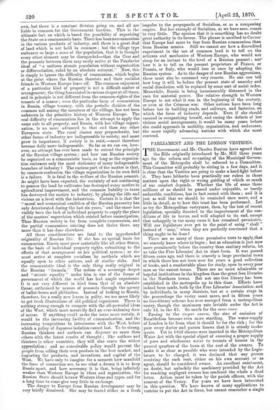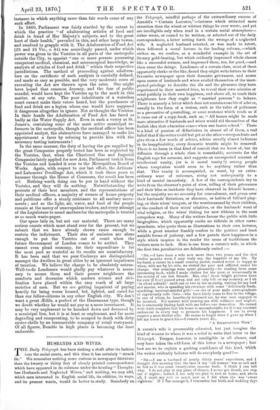PARLIAMENT AND THE LONDON VESTRIES. T HE Government and Mr. Charles
Buxton have agreed that the Bills originally introduced by Mr. Mill three years ago for the reform and re-casting of the Municipal Govern- ment of the Metropolis shall be referred to a Committee. This Committee will probably be sitting in a few days, and it is clear that the Vestries are going to make a hard fight before it. They have hitherto been practically our rulers in those matters upon the right or wrong guiding of which so much of our comfort depends. Whether the life of some three millions of us should be passed under enjoyable, or barely endurable, conditions, has in fact rested with them ; and it is just as well that we should be reminded once more; and a little in detail, as to how this trust has been performed..., Let us try the Metropolitan vestryman, then, by the test of recent legislation, specially directed to the improvement of the con- ditions of life in towns, and well adapted to its end, except that unhappily in too many cases it has remained permissive. Will our legislators ever get to the point of using " shall" instead of "may," when they are perfectly convinced that a thing ought to be done ?
There are so many of these permissive tests to apply.that we scarcely know where to begin ; but as education is just now more prominently before the country than sanitary reform, let us take the Free Libraries' Act to start from. It was passed fifteen years ago, and there is scarcely a large provincial town in which there has not been now for years a good collection of books, and a comfortable place for study, open to every poor man on the easiest terms. There are no more admirable or hopeful institations in the kingdom than the great free libraries in the Northern towns. But not one free library ha i been established in the metropolis up to this time. Vfforts have indeed been made, both by the Free Libraries' Association, and by individuals, in many districts, but at a certain stage in the proceedings the vestry must move, and in fifteen years no free-library scheme has ever emerged from a metropolitan vestry, though the maximum rate leviable under the Act is only ld. in the £1. So much for the mens sana.
Passing to the coi]us sanum, the sins of omission of Bambledora become even more startling. The water-supply of London is far from what it should b3 for the rich ; for the poor every doctor and parson knows that it is utterly inade- quate. Yet in 1852 clauses were inserted in the Metropolitan Water Act with the special object of ensuring a proper supply of pure and wholesome water to tenants of houses in the poorest quarters of the town at the cost of the owners. To make it as clear as possible who were intended by the Legis- lature to be charged, it was declared that any person receiving the rack rent, either on his own account or as agent, should be considered owner. An excellent enactment, no doubt, but unluckily the machinery provided by the Act for reaching negligent owners has rendered the whole a dead letter. Action must be taken by the parish officers, with the consent of the Vestry. For years we have been interested in this question. We have known of many applications to vestries to put the Act in force, but cannot remember a single instance in which anything more than fair words came of any such effort.
In 1860, Parliament was fairly startled by the extent to which the practice "of adulterating articles of food and drink in fraud of Her Majesty's subjects, and to the great hurt of their health," prevailed in this, and other large towns, and resolved to grapple with it. The Adulteration of Food Act (23 and 24 Vic., c. 84) was accordingly passed, under which power was given to the Vestries in all parts of the metropolis outside the City, to appoint "one or more persons possessing competent medical, chemical, and microscopical knowledge, as analysts of articles of food and drink" within their respective jurisdictions. The method of proceeding against adultera- tors on the certificate of such analysts is carefully defined, and made as easy as possible, and the very moderate costs of executing the Act are thrown upon the rates. One might have hoped that common decency, and the fear of public scandal, would have kept the Vestries up to the mark in this matter, at any rate. The poor inhabitants of a waterless court cannot make their voices heard, but the purchasers of food and drink are a legion whom one would have supposed it dangerous altogether to ignore. Not so thought the Vestries. In their hands the Adulteration of Food Act has fared as badly as the Water Supply Act. Even in such a vestry as St. James's, containing some of the most active municipal re- formers in the metropolis, though the medical officer has been appointed analyst, the obstructives have managed to make his appointment a farce by refusing to provide him with the necessary testing instruments !
In the same manner, the duty of having the gas supplied by the great Companies properly tested has been so neglected by the Vestries, that, when the Chartered Gas and Imperial Companies lately applied for new Acts, Parliament took it from the Vestries and handed it over to the Metropolitan Board of Works. Again, with respect to our last effort, the Artizans' and Labourers' Dwellings' Act, which it took three years to hammer through the House of Commons, the result has been nil. Nothing worth doing can be put in hand without the Vestries, and they will do nothing. Notwithstanding the protests of their best members, and the representations of their medical officers, a majority of owners of house property and publicans offer a steady resistance to all sanitary move- ments; and so the light, air, water, and food of the people remain at the mercy of unscrupulous traders, and every attempt of the Legislature to mend matters for the metropolis is treated as so much waste-paper.
Our space fails us, but not our material. There are many serious counts which must stand over for the present, but we submit that we have already shown cause enough to sustain the indictment. Their sins of omission are alone enough to put the Vestries out of court when the future Government of London comes to be settled. They cannot even plead economy, for their expenditure is for the most part as wasteful as its results are unsatisfactory. It has been said that we poor Cockneys are distinguished amongst the dwellers in great cities by an ignorant impatience of taxation. We believe the charge to be absolutely untrue. Well-to-do Londoners would gladly pay whatever is neces- sary to secure them and their poorer neighbours the comforts and decencies which modern science and civi- lization have placed within the easy reach of all large societies of men. But we are getting impatient of paying heavily for being worse housed, fed, lighted, and cared for than our fellow-citizens in any other English city. We don't want a great /Edile, a prefect of the Haussmann type, though we doubt whether he would not pay as a mere investment. It may be very unpleasant to be knocked down and devoured by a municipal lion, but it is at least as unpleasant, and far more degrading and exasperating, to be scraped to death with dirty oyster-shells by an innumerable company of retail vestrymen. Of all figures, Bumble in high places is becoming the least endurable.































 Previous page
Previous page